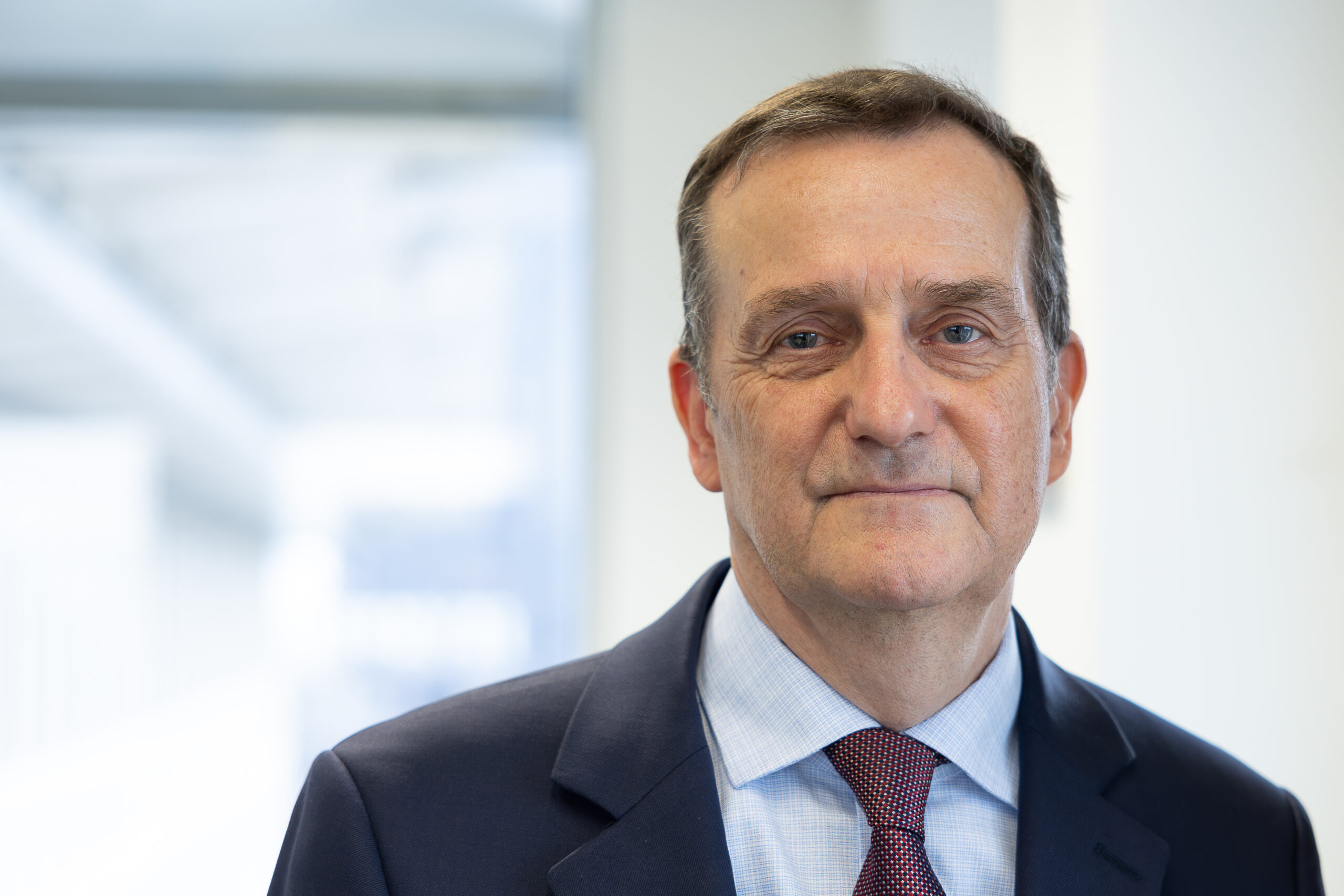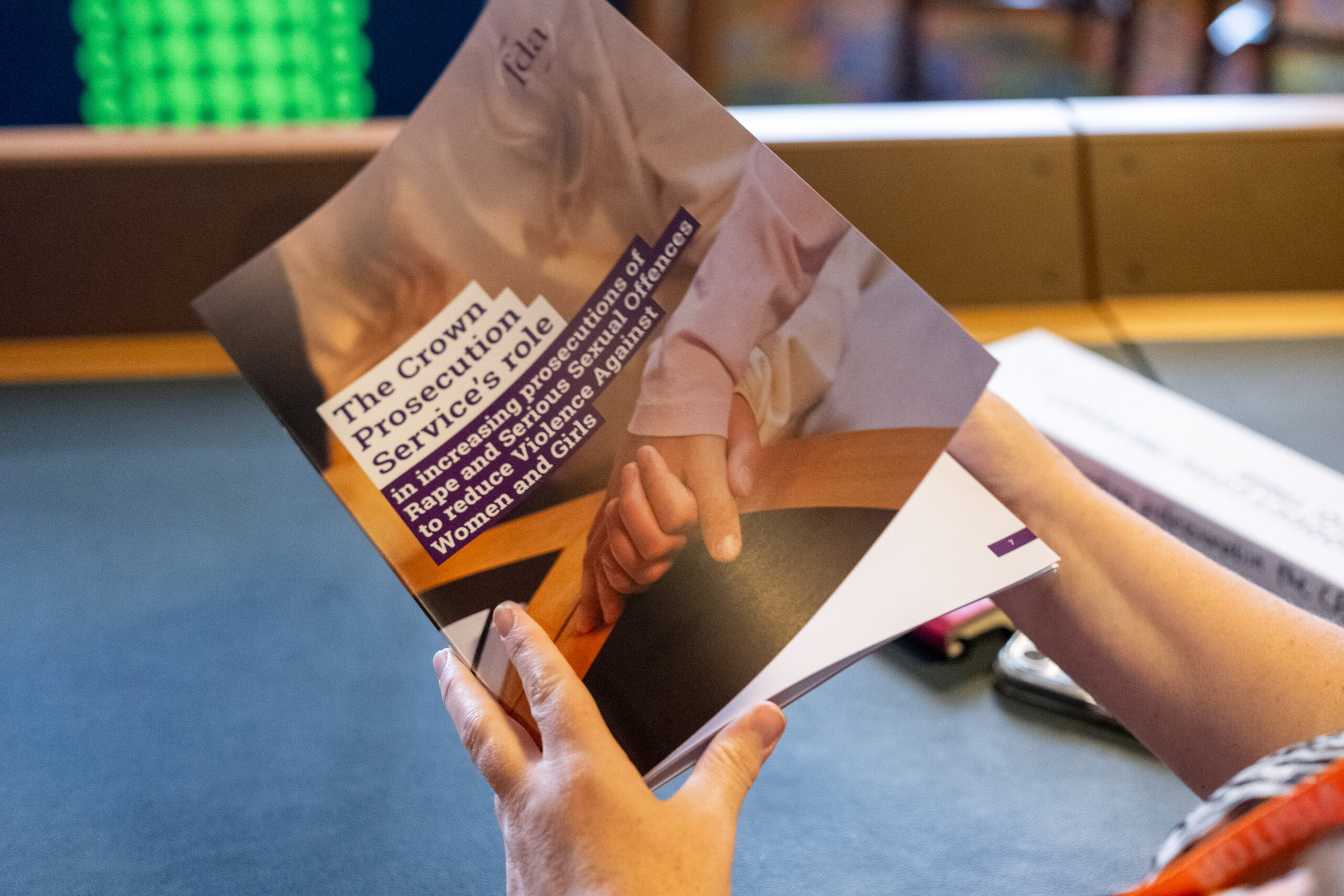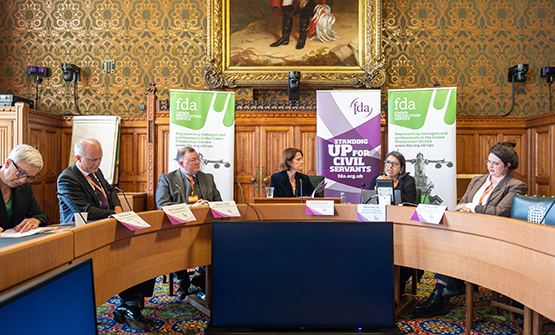Under significant pressure: Interview with Director of Public Prosecutions

Tom Nathan speaks to Crown Prosecution Service Director of Public Prosecutions Stephen Parkinson about CPS’s handling of riots, the importance of impartiality and his plan to help reduce unmanageable prosecutor caseloads.
Since he was in his mid-20s, Stephen Parkinson made no secret of his ambition to one day lead the Crown Prosecution Service (CPS) as Director of Public Prosecutions (DPP). However, when Parkinson left the civil service in 2003 to join a private practice, few would have thought he would wait another 21 years to apply for the role.
Parkinson began his five-year term as DPP in 1 November 2023, having retired from Kingsley Napley LLP that year, where he worked as a defence solicitor.
How has he found the transition from private practice to public service? “The biggest change has been reverting back to being in a hierarchy. I was the senior partner – head of a law firm – with 81 partners. And, at least in theory, we are all equal.” In order to make progress at his firm, Parkinson needed to build consensus with his fellow partners, which he feels required “openness and collective decision making…I am adopting that style in my leadership of the CPS”.
“The issues that we deal with necessarily are much more complex than in private practice. In private practice – without wanting to oversimplify this – it was there about generating business, doing that legal work well, and making a healthy profit. In the public sector our measures of success are necessarily much more nuanced than that and the issues are of much greater magnitude”.
The complexity of the work means “there’s more planning”, which “can be at the enemy of… dispatch. With some of the policy areas and the wider criminal justice issues that we have to deal with, I find that tension between getting it right and doing it quickly can sometimes be a bit of a frustration”.
“I recognise that I can’t necessarily expect the same approach [as the private sector] for understandable reasons. If things go wrong, the implications are enormous.” Parkinson, however, says he won’t let this stop him from always asking “how quickly can we do this?”
The CPS can and does have to work at speed on a number of issues, he is quick to add, praising the “frontline work that our lawyers and our support staff do”. Parkinson highlights the work of CPS Direct (the CPS’s out-of-hours service) as an example. “If someone’s arrested overnight, you’ve got to make a decision quickly”, adhering to the timetables of the wider criminal justice system.
Prior to joining Kinsley Napley, Parkinson had a long and successful career in the civil service, starting at the CPS in 1984, before moving to the wider civil service, ending his first stint in the civil service as deputy head of the Attorney General’s Office.
How has the civil service changed since he left in 2003? “I think we’re much better at dialogue, at trying to solve problems together. There’s a lot more work with ministers from other departments. I regularly meet ministers from the Home Office, the Ministry of Justice and that’s a wholly good thing. I think we’re much less territorial than we used to be”.

Since becoming DPP, Parkinson says he is most proud of making “a real effort to build relationships with the police and to foster even better cooperation across the criminal justice system”. The police and CPS are required to work collaboratively – from charging, to victim support through to court. However, in recent years this relationship has been strained, as court backlogs have grown and the criminal justice system comes under increasing pressure.
Since taking charge, Parkinson believes he has made progress improving communication between the two organisations. “There’s lots that needs to be done… in terms of reducing delays, supporting victims better, which can only be done if we’re all working together. We’re all there to do the same thing, which is to deliver justice”.
“Whenever I go around the 14 CPS areas, I always make time to see the local chief constables and the local resident judges. There’s definitely been a significant improvement in the level of dialogue and cooperation. I am listening to the police”.
He believes this improved dialogue will improve the quality of their decisions. “I’m not territorial. I’m just interested in improving things”.
The biggest challenge faced by Parkinson and the CPS during his tenure is also a particular point of pride.
The riots and violent protests that broke out in the aftermath of the Southport stabbings in July 2024 was the largest incident of social unrest for over a decade – with violence against police, racist attacks, and arson. However, the emergency services and the criminal justice system were widely praised for their swift response. More than 100 extra prosecutors were deployed to help with charging decisions and advice. By 8 August (just days after the riots had ended) 200 people had been sentenced with 177 imprisoned.
What was it like to be at the head of the CPS’s response to these events? “The whole of the CPS responded with a complete recognition of the importance of the work they were doing… we worked incredibly closely with the police and the court service… it was a collective effort. I felt that the whole criminal justice system just stepped up a gear”.
Parkinson praised staff from across the organisation who offered to help in any way they could. “There was just a strong sense that what we were doing was the most important thing going on in the country at that time and that gives you a real sense of how worthwhile… the job [is]”.
As the violence continued, Parkinson felt the need to speak out publicly about the CPS’s response. “I came to a point where I thought I just need to speak because I am one of the top law enforcement officials. I need to be saying how we are responding…I felt that the country could hear what the Chief Crown Prosecutor was doing about this”.
Internal communication was also integral to the CPS’s response. “I chaired a daily meeting… with my senior lawyers, the head of communications, head of policy and we did a situation report on the number of overnight arrests and decisions that needed to be made. Then at a level below me, there was a twice-a-day meeting with all the Chief Crown Prosecutors and they then fed down to their staff”. At these meetings it was stressed that the threshold test should be applied – this is used when the seriousness or circumstances of the case justifies the making of an immediate charging decision. “I sent out that very strong message early on and it reached right down to the front line”.
“I feel proud of the way we responded but I feel collectively the organisation feels proud…I see that sense of pride across the criminal justice system and I think it’s well deserved.”
In recent decades, DPP has been a position predominantly held by barristers. Does Parkinson believe his experience – training as a barrister, then working as a solicitor – brings any unique opportunities to the role? “The reality of work in the CPS is it’s largely concerned with building cases ready for trial. A proportion of our lawyers then do the advocacy. But the vast majority of the work is around building that case… So my experience is wholly relevant to that”.
Parkinson admits he would like to see his successor come “from within the CPS, because I think that’s frankly a better fit… the right model is a seasoned prosecutor familiar with the work we do”. He recalls a conversation from his first stint at the CPS: “I was in my late 30s. People knew then that I wanted to be DPP… and a very senior colleague said to me, ‘Stephen, you’ll never be DPP. They’ll never make an internal appointment’”.
“External barristers,” he continues, “they’re very good at weighing the evidence and giving us advice on whether we’ve met our evidential tests, but there’s another limb to our decision to prosecute… the public interest test [asking if CPS should prosecute a case]. The difficult question is where does the public interest lie? External barristers don’t advise on the public interest”.
Why do external candidates keep being appointed? “I think there was that worry that because it’s such a high profile job and because there’s so much external engagement… there was a sense within those who made these appointments that they wanted someone who’s very used to being an advocate”.
Parkinson wants the CPS to be more visible. “What I’m trying to do… is to encourage my colleagues to engage with the media much more… You’ll see more… Chief Crown Prosecutors going out, being interviewed on television, speaking to the press, developing those skills which are an important part of the DPP’s job”.
At the beginning of the 2010s the CPS – like the whole civil service – faced deep cuts that saw a sharp and significant decrease in staffing numbers. Between 2010 and 2013 the CPS lost 23% of its barristers and 22% of its solicitors – and with them, decades of experience. However, this fall has been reversed in in recent years – the number of staff rose from 6,004 in the 2018/19 period to nearly 7,600 currently.
Although the organisation worked hard to increase its numbers, it has been left with an unbalanced workforce and has lost invaluable institutional knowledge.
Parkinson accepts “there is a big gap in the middle of the CPS”. “We’ve got a lot of people in their 20s and early 30s and we’ve got a significant number of 50 plus, but there’s a gap in the middle and that was a consequence of austerity”.
As DPP, Parkinson hopes to retain as much experience within the service as possible. The expansion in staffing numbers took place in a tight labour market, with fewer individuals qualifying as criminal solicitors. Therefore, the CPS has found it hard to recruit the right people to the right roles. This meant that in same period staff turnover rose from 7.3% to 8.1%. New staff are being recruited – CPS is struggling to keep them.
“We very much value our more experienced colleagues. I know some of them are coming up for retirement. We want to make it as easy as possible for them to stay so they can continue to contribute their experience”.
“In the meantime”, Parkinson adds, “we are investing a lot in training and developing our people… We want to retain those individuals and then gradually fill that gap from below… my aim is just to keep our people to give them rewarding careers”.
The DPP also hopes to improve retention by increasing efficiency and reducing pressure on staff: “We are an organisation under significant pressure. A lot of the work I’m doing is trying to make us more efficient.
“Obviously that’s good for delivering justice, which is our primary aim, but it will also have the consequence of reducing the pressure on our staff. We’re taking a very, very detailed look at everything we do – from the moment we receive a case from the police all the way through to trial – and asking ourselves, ‘Do we need to do this?’ ‘Can we do it better?’ We’ve got some quite significant projects underway which are aimed at that. Our people have got too much pressure on them. I’m very conscious of that and I want to reduce that in order to retain them and also so we can do an even better job.”
Adding to the pressure placed on CPS staff is increasing workloads and caseloads. A recent FDA survey found that across the CPS, 89% of staff believed that their workload has increased over the last three years.
One cause of increased workload highlighted by our members is the proliferation of digital evidence and the extra work involved in examining digital devices, Body Worn Camera videos, or obtaining third-party material. However, this is placing a great administrative burden on CPS staff. The HMCPSI Rape Inspection “saw requests for forensic examination of phones taking up to 11 months to complete, and securing third-party material taking an inordinate amount of time.”
Parkinson looks to disclosure obligations as a target for reform. “We have to disclose material which is relevant to the defence, even if it isn’t part of our case”. Outside of the CPS, Parkinson highlights an independent disclosure review that is underway, which will recommend changes to help with this.
He adds: “I’ve got my own project underway…we’ve got some joint working groups with the police looking at the whole question of proportionality. Are we asking the police to give us more material than we need? I think the answer at the moment is yes. If we can cut down the amount of material that we require them to give us, then that will cut down the amount of material we have to review”.
Parkinson also believes Artificial Intelligence (AI) can help to reduce workloads: “I know this from private practice, [AI] can make an enormous difference in terms of cutting down the amount of manual review you have to do”.
The government is currently hoping AI will drive an increase in productivity across the public sector. What would this look like in the CPS? “There’s potential for AI to summarise the statements and exhibits that we get as prosecutors. We’d always check the summary against the originals, of course. But we have to produce review notes in every case and that can really cut down the workload, leaving us free then to evaluate what the decision is going to be in the light of that information”.
DPP is a challenge Parkinson has wanted to take on for 40 years – and he has taken it on a crucial moment in time for the CPS and criminal justice system. But how does he balance this workload with his personal life? “I’ve got a very happy family life… I’ve got three grandchildren, a fourth on the way… they bring me a lot of joy, as well as aggravation”.
He concedes that “there isn’t a lot of free time… it’s a very all-consuming job this… I’ve never worked harder than I’m working now… I absolutely am not complaining about that”.
“But it’s the most worthwhile thing I’ve ever done in my life”.
CPS workloads: tackling the backlog
Last year the FDA published a report that looked at the CPS’s role in increasing prosecutions of Rape and Serious Sexual Offences (RASSO), focusing on what barriers our CPS members face on a daily basis and the resources they need to remove them.
This included how to tackle Crown Court backlogs (with more than 10,500 sexual offence cases outstanding in the system). The report highlighted that most advocates are self-employed and take both prosecution and defence work, and identified that it is becoming increasingly difficult to find prosecutors for cases listed for trial, causing further delays in the system.
Does the DPP believe that increasing the number of in-house Crown Advocates to prosecute cases could help to reduce the backlog? “Increasing the number of in-house advocates is something I’m keen to do. I introduced a change last year which meant that… half our intake of trainee lawyers are actually trainee barristers and I removed a barrier to them becoming Crown Advocates”.
The importance of impartiality
The CPS is a non-political organisation and its staff – both lawyers and support staff – are proud to uphold the impartiality of the service.
“I feel very strongly indeed about the importance of impartiality for all public servants, not just lawyers but every public servant has that responsibility”, says Parkinson. “That includes the responsibility to say uncomfortable things from time to time to ministers or to more senior civil servants… particularly if it’s an ethical issue. You should challenge that and pursue it as far as is needed”, he adds.
“I’m glad to say that in the context of prosecution decision making, it’s not an issue. The Attorney General is vigilant to protect the CPS and frequently says… that operational decisions are a matter for me”. Although the CPS is a non-ministerial department, it is superintended by the Attorney General. “We have a framework agreement which protects the impartiality of prosecution decisions”. He stresses that challenges to impartiality the CPS faces are often down to “public expectation rather than political pressure”.
To illustrate his point, Parkinson highlights the Campbell Case of 1924. The Campbell Case – named after communist newspaper editor J.R Campbell – was a key factor in the fall of Ramsey MacDonald’s first Labour government, after the Prime Minister and Attorney General Sir Patrick Hastings were judged to have compromised the prosecution instituted by the then-DPP, leading to the government losing a vote of confidence. The current Director of Public Prosecutions says he has often mentioned the Campbell Case throughout his public sector career, warning of the dangers of failing to uphold impartiality.
Reflecting on the current culture at the CPS, Parkinson concludes: “We pride ourselves on our independent and objective prosecution decision making. That’s the only thing that matters. And we have a very strongly independent and robust culture”.
Latest news
-

Under-resourced and over-worked
Tom Nathan on the FDA’s report into the financial and administrative challenges present in the justice system, its advice for the new government on increasing prosecutions of Rape and Serious Sexual Offences, and next steps to ensure the union’s message is heard.
-

FDA welcomes additional CPS funding to support victims of crime
The FDA has welcomed that the CPS will be receiving additional resources. The announcement follows the recent publication of the FDA’s report examining the CPS’s role in increasing RASSO prosecutions.
-

CPS must have additional resourcing to increase RASSO prosecutions, Parliamentary event hears
Last week in Parliament the FDA launched a new report calling for consistent direction of policy and additional resourcing of the justice system, in order to increase prosecutions of serious sexual offences.